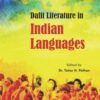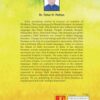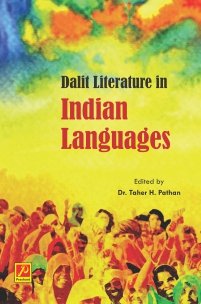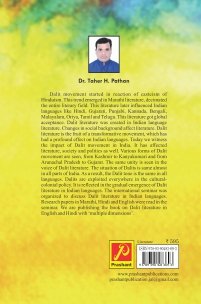- DESCRIPTION
- INDEX
Dalit movement started in reaction of casteism of Hinduism. This trend emerged in Marathi literature, decimated the entire literary field. This literature later influenced Indian languages like Hindi, Gujarati, Punjabi, Kannada, Bengali, Malayalam, Oriya, Tamil and Telugu. This literature got global acceptance. Dalit literature was created in Indian language literature. Changes in social background affect literature. Dalit literature is the fruit of a transformative movement, which has had a profound effect on Indian languages. Today we witness the impact of Dalit movement in India. It has affected literature, society and politics as well. Various forms of Dalit movement are seen, from Kashmir to Kanyakumari and from Arunachal Pradesh to Gujarat. The same unity is seen in the voice of Dalit literature. The situation of Dalits is same almost in all parts of India. As a result, the Dalit tone is the same in all languages. Dalits are exploited everywhere in the cultural-colonial policy. It is reflected in the gradual emergence of Dalit literature in Indian languages. The international seminar was organized to discuss Dalit literature in Indian languages. Research papers in Marathi, Hindi and English were read in the seminar. We are publishing the book on Dalit literature in English and Hindi with ‘multiple dimensions’.
- Socio-Cultural Dimensions in Kashmiri Literature – Prof. Mushtaq Ahmad Zargar
- Portrayal of Women in Dalit Literature: A Study of P. Sivakami’s The Grip of Change and The Taming of Women – Dr. Shampa Malhotra
- Protest Songs from Maharashtra : An Overview of the ‘Ambedkari Jalsa’ – Dr. Shardool Thakur
- Quest for Identity and Equality in Dalit Autobiographies – Sheetanshu Prabhakar Singh
- Concern for Nature amongst the Tribals – A study of Mahasweta Devi’s novel Chotti Munda and His Arrow – Dr. Bosudha Bandyopadhyay
- In Resistance and Fiasco to Brahminism : Exploring Bengal’s Unsung Namashudra Movement and Its Contemporaneity – Dr. Md Humayun SK, Sahina Akhtar
- Dalit Literary Text Valmiki’s Joothan : A Critical Perspective – Dr Megha Singh
- Caste in Fiction and Fictionalised caste: A look into the Achhut volume of Hindi Magazine ‘Chand’ dealing with the early 20th century Dalit Question in North India – Monalisha Choudhury
- Depiction of Dalit Women in the Plays of Vijay Tendulkar – Dr. Poonam Matkar
- The Portrayal of Anti-Semitism and Power Dynamics in Elfriede Jelinek’s Novel Wonderful Wonderful Times – Farooz Ahmad Ganai, Dr. Gowher Ahmad Naik
Author
Related products
-
Soft Skills Development
Rs.105.00 -
Career Management
Rs.110.00 -
Methods of Teaching English
Rs.175.00 -
Business Skills
Rs.295.00








